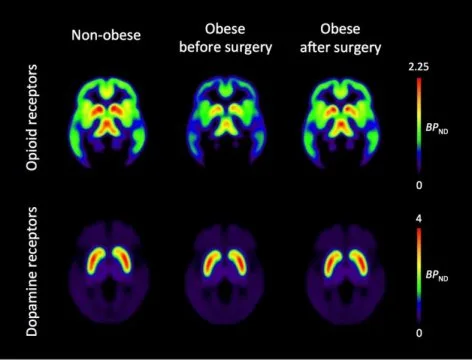Scientists in Finland have discovered that weight-loss surgery not only produces rapid weight loss, but also has a direct effect on the pleasure centres of the brain restoring decreased levels of our opioid receptors, the chemical message transmitters that play a major role in how satisfied humans feel after eating.
The revelation is a major breakthrough in our understanding of how obesity affects not just the number of fat cells in our body, but also its ongoing effects on brain chemistry – in other words, why people eat too much and what changes in those who are obese.
Researchers at Aalto University and the University of Turku in Finland say that obesity surgery restores opioid neurotransmission. In simple terms, a neurotransmitter is a neuron that helps messages pass between the synapses in our brains.
Opioid receptors are neurotransmitters responsible for initiating feelings like euphoria and satiety and in turn act as inhibitors in certain behaviours, particularly in eating. They also exist inside the intestinal tract.
Obese people have decreased numbers of opioid receptors in their brains, meaning they do not get the same signals to stop eating as non-obese people.

The Finnish discovery, published in the scientific journal Molecular Psychiatry, reveals that surgery “normalises” the dopamine levels for obese people, bringing the levels back to the same levels as those of people within a healthy weight range. The researchers measured opioid and dopamine receptors in the brains of both healthy weight and obese individuals using nuclear medical imaging (positron emission tomography or PET) at the Turku PET Centre. The obese subjects underwent bariatric surgery, after which their brains were scanned again.
“Our findings highlight how obesity is associated with brain-level molecular changes and how weight loss influences appetite control at the molecular level in the brain. It is possible that the lack of the brain’s opioid receptors predisposes the obese individuals to overeating to compensate for decreased hedonic [relating to pleasurable sensations] responses in this system. Obesity surgery however recovers this bias in the brain,” says Professor Lauri Nummenmaa from Aalto University.
“Because [the] brain’s opioid system recovers following weight loss, it is likely that the lower levels in the obese are due to weight gain. Altered neurotransmitter levels are thus a consequence rather than a cause of obesity. These results help us to understand the mechanisms involved in weight loss and appetite, and provide new insight into behavioural and pharmacological treatment,” says researcher Henry Karlsson from Turku University.
Obesity is perhaps the greatest challenge to modern human health worldwide because it is associated with serious medical conditions such as Type 2 diabetes, coronary heart disease and stroke.
Obesity is also associated with alterations in the brain circuits that generate pleasurable sensations when eating, thus predisposing individuals to overeating.



